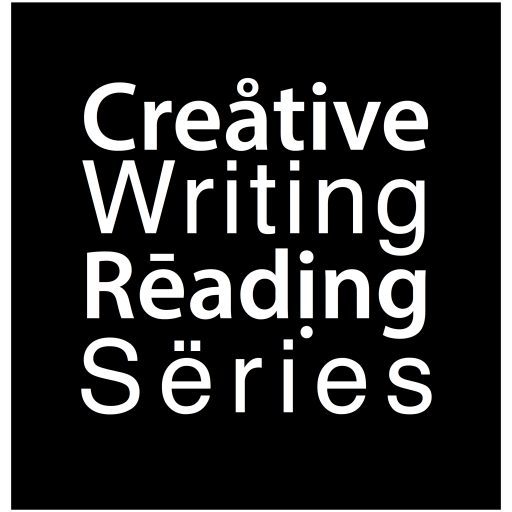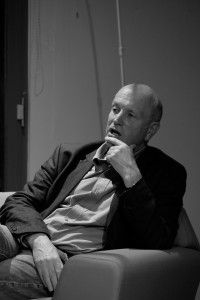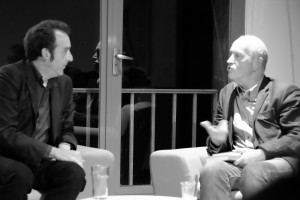Professor Iain Sinclair at the Creative Writing Reading Series, 13th October
Iain Sinclair, who joins the School of English as our first ever Guest Professor of Creative Writing for the next three years, took us on a journey last Tuesday through the writer’s territory, reading from his books London Overground: A Day’s Walk Around the Ginger Line and Black Apples of Gower. But the evening was not simply a book reading, nor reminiscence, nor an inside look at his method, although it was all of these things; Professor Sinclair’s talk spanned dimensions of past and present, shamanic caves and dead pigeons, the warp and weft of his seemingly extempore narrative taking in text, analysis, cultural history and personal anecdotes, from his beginnings in self-publishing in the 1970s to his current position at Kent.
He opened with a question of positioning; where would his books appear in a book shop? These days he most often ends up in travel writing, but his approach to writing remains the same as it was when he wrote books described as ‘novels’: to tell a story, and to do so in unexpected ways that resist generic categorisation. Regardless of any notion of genre, he aims in all of his writing to avoid the manipulation and conditioned reflexes associated with familiar narrative patterns.
He referred to his book London Orbital as an exorcism by walking, and of taking enormous, gigantic walks that define life. He outlined his writing as being in four movements: the first looks to start placing the reader somewhere physically which allows them to adjust to the microclimate; the second begins some kind of quest or movement and momentum; the third is a ‘dark night of the soul that tries to undo the simplicity of the journey’; the fourth is ‘getting away from what you’ve created or, generally, thinking into the next book—so there’s a kind of eternal project and the obligation to write for this thing goes on: one book is only an incident along a long chain of incidents that inform a life.’ (He tells us that London Overground had begun as a pilgrimage to Canterbury and he had ended up following the railway line instead, before ending at a place that took him to his next book.)
Audio of reading one: opens new window
He goes on to quote Pynchon, ‘riffing’ in a similar vein:
Off they go on a tour of the inexhaustible galleries of New York annoyance, zapping loudmouths on cellular phones, morally self-elevated bicycle riders, moms wheeling twins old enough to walk lounging in twin strollers…
In the case of London Overground, which he walked with his friend and collaborator the film-maker Andrew Kötting, Sinclair was going from the known to the unknown, from the microclimate of East London via the Overground to the parts of London he is less familiar with. He recalled passing the front door of Angela Carter and then remembering how, while he was working as a book dealer, he had visited her and been shown her stash of unsold books that had been returned by her publisher; she signed a sackful for him which he sold off to fans and ‘cultists.’ This story is emblematic of the movement and energy of the evening; providing layered and interleaved insights into the changing urban landscape of London, the shifts and vagaries of the books market, the writing process, and a long and deep-seated commitment to a writing life. It takes a ‘special kind of energy’ to pursue and persist in being a writer, he explained. When it works well there is ‘an otherness’; there must be a seriousness to storytelling and a desire to take readers along for the journey.
His next reading departed from the sinister dune structures in Milwall, where nobody can be seen except a ‘few people walking pitbulls’ against the ‘whispering presence’ of the railway.
Audio of reading two: opens new window
We journeyed from hipster-ville present to Freud’s Hampstead, to Virginia Woolf and Sherlock Holmes, via the caves formed by the railway arches around the ‘Ginger Line’. He delivered an anecdote of visiting the house where Rimbaud lived with Verlaine. Another example of curious and incongruous layering: he stepped inside to see a huge poster of Margaret Thatcher, only to be assured by the house’s current owner, ‘Don’t worry, I’m not Conservative, I’m UKIP, I’m UKIP.’ Sinclair commented on this vignette: ‘He has turned again this house into a museum of this moment.’
Audio of reading three: opens new window
This reading, like the other two before it, was delivered with great energy and urgency. He went on to admire this same trait in Louis-Ferdinand Céline’s novel London Bridge, commenting that it contains a “mad energy” that no English writer has got near to since Dickens. He described London Overground as neither fiction nor essays but ‘a kind of docu-fictional seizure’ placing it within a formal tradition that harks back to Bunyan—a journey which is at once literal and figurative, an exploration of self as territory.
His fourth and final reading, from Black Apples of Gower, took us far from London to the Gower Peninsula. This book concerns a landscape that is ‘very primal, very savage and very unknowable’, a place that allows the release of identity, in which he explores an idea that he had in London, of our ‘cave of origin.’ Black Apples of Gower is named after a series of paintings by the artist Ceri Richards, and Sinclair recounted how he walked the limestone coastline, seeking a way in to Paviland Cave, which he describes in his reading.
Audio of reading four: opens new window
With the closing of his fourth reading, we were left in the cave as he finally attained it, but also, in this fourth movement of the talk, invited into the next book, as if the next may well be our own, an invitation to continue our own Eternal Project of writing.
With time for questions, Professor Sinclair was asked by a student what his role was to be at the School of English.
‘I’ve been to Kent a couple of times and found that it has a much better vibe, as we used to say, than most places I’ve been to,’ he said. ‘There’s something good about it. It’s the presence of poets and the nature of the things around and its pitch, if I can call it that, of looking towards Europe—and all of those things are attractive.
‘The job is to be available to anybody who feels they can respond or get something of use from my presence and what I’ve done. And I’d be very happy to engage either one-to-one or in groups. I mean, I’ve only been here for two days: I’ve given two talks; introduced a film; and took a seminar in poetry where there was one poetry student; and a seminar in fiction. I’m learning a lot! What can I bring? We’ll see. I’m here for three years.’
If this reading to Kent students, staff and members of the public is anything to go by, it was well worth the wait for his pilgrimage to Canterbury.
Chris Scott


